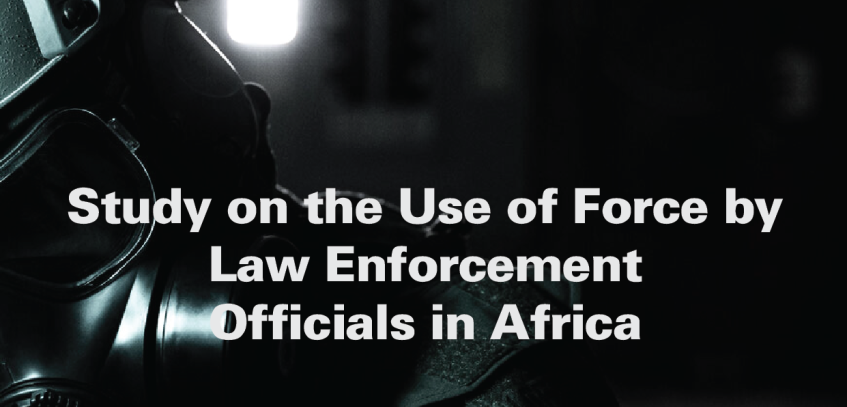In few words I would like to remind you of the history that led to the instrument we now have in our hands, which I believe will be of great value so that our law enforcement officers can effectively work with the necessary balance between respect for human rights and the guarantee of public order and tranquillity.
In 2020, at its 27th Extraordinary Session, the ACHPR adopted Resolution 437, which called for an assessment of the excessive use of force by law enforcement agencies in our African countries.
There was concern that there were often episodes of excessive or disproportionate use of force, especially lethal weapons, by police forces to replace other deterrent forces. This flagrantly violated the greater good, which is life.
To this end, it indicated 3 Mechanisms, namely the Death Penalty, Extrajudicial, Summary or Arbitrary Executions and Enforced Disappearances, the Defenders of Human Rights Defenders and and Focal Point on Reprisals in Africa as well as Prisons, Conditions of Detention and Policing in Africa.
The study received support of the Committee for the Prevention of Torture in Africa, which contributed to its success.
The Centre for Human Rights of the University of Pretoria coordinated the study and provided technical assistance to the Commission for that purpose.
I would like to take this opportunity to pay tribute to the great Professor Christof Heyns, who left us too soon. We discussed the details of the study, its purpose and scope with him before he passed away.
However, I recognise that his team did not fall short of expectations and today we have the pleasure of honouring him with the publication of this study.
This study was conducted over a period od three years, involving partners and experts from various backgrounds, including representatives of States parties, national human rights institutions, NGOs and independent experts, working on issues related to the physical and psychological consequences of the use of lethal force by law enforcement officials, which led to passionate discussions on a range of topics, including determining the specific roles of law enforcement officials.
The first meeting was held virtually in December 2020, after the dark period known as the Covid-19 pandemic, which compelled the African Commission on Human and Peoples' Rights to change its modus operandi. This first meeting was followed by two others in Pretoria and Lusaka in 2022.
At the beginning of this study, the Commission sent a request to several countries appealing for their input in the preparation of the same. In the process, three basic questions were asked, with the aim of consolidating an overview of the subject. Two countries responded to the request and provided valuable information.
We would also like to acknowledge the support of other States parties, who kindly made their senior officials available to discuss certain technical aspects, as without their input we would not have reached the excellent conclusions we did.
During the second phase of the study, we received contributions from three NGOs, which drew the Commission's attention to specific issues, such as the mental health of law enforcement officers and its impact on the use of force.
A training tool for law enforcement and policing officials has been proposed to complement this study, but due to the technical nature of the said document, it has not yet been finalised.
In conclusion, I would like to thank the people and institutions that have consistently and persistently contributed to the success of this work:
My gratitude to former Commissioners Zainabo Sylvie Kayitesi and Maya Sahli Fadel, chairs of the working group on the death penalty, extrajudicial, summary or arbitrary executions and enforced disappearances in Africa.
To the commissioners, Rémy Ngoy Lumbu, our chairperson, Hatem Essaiem and Idrissa Sow, for their dedication in bringing this study to a successful conclusion.
Many thanks to the various actors involved in the various stages of this study, in particular The members of the relevant AU organs; the members of the UN working group on the death penalty and the UNODC.
Police Commissioner Lassina Traoré and Deputy Police Commissioner Edmond Tapsoba of Burkina Faso.
Professor Stuart Malsen, Honorary Professor at the Centre for Human Rights at the University of Pretoria, Mr Bartolomeu Milton of Pro-Bono Angola, Mr Peter Kiama of the Independent Forensic Unit, the African Forum for Civilian Oversight of Law Enforcement (APCOF), the Danish Institute for Human Rights, Mr Victor Mhango of the Centre for Human Rights and Democracy in Africa and UNODC. Victor Mhango from the Centre for Human Rights Education, Advice and Assistance (CHREEA), Cédric Picarat and Joel Gbegan from the ICRC and Eva Nudd from the NGO DIGNITY.
I would particularly like to thank Mr Thomas Probert for his availability and his rigour in conducting and drafting this study.
To Ms Josiane Tapsoba Koné, Mr Maulo Nfinda Dombaxi, Mr Mohamed Youssef, Ms Anita Bagona, Ms Estelle Nkounkou, Ms Fatou Faal and Mr Etwell Karikoga for their invaluable help, without which this study would not have been possible.
To all the other partners who, at one time or another, collaborated directly or indirectly in the success of this work, my most sincere thanks.
Maria Teresa Manuela
Commissioner
Special Rapporteur on prisons, detention conditions and policing in Africa







